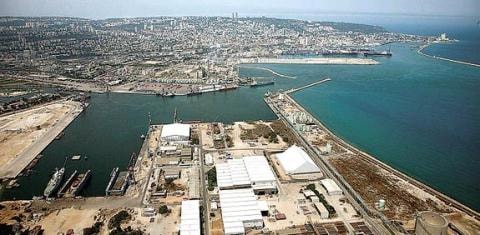US fears being kicked out of Israeli ports by China
The US is clearly worried about the situation where China will not allow the use of Israel's Haifa port when after 2021, it will be under Beijing's control.
This information was reported by the Jpost newspaper, citing a US military source in the Middle East, saying that they may be forced to stop operations at the Haifa port. It is known that Haifa is Israel's largest port and regularly hosts naval exercises between the US and Israel and welcomes US warships.
But the unexpected fallout from a 2015 deal between Israel's Ministry of Transport and the Shanghai International Port Group (SIPG) has cast doubt on the future of the US-Israel partnership.
|
A corner of Haifa port. |
The agreement between SIPG and the host country will allow the Chinese company to control the port of Haifa for 25 years, starting in 2021. To put this agreement into practice, the Chinese company paid Tel Aviv $2 billion for the project and is said to have plans to expand the port of Haifa.
The representative of the US Navy's 6th Fleet, Commander Kyle Raines, affirmed that the partnership with Israel is not affected at present. However, he added that he does not know what will happen to the US in Haifa after 2021.
Before the US publicly expressed concerns about the future of Israel's largest seaport, retired US Admiral Gary Roughead warned that a Chinese-run port could force the US Navy to berth its ships elsewhere.
With its prime location not far from an Israeli naval base, where the country's submarine fleet is based, and according to many sources, Chinese shipping activities will be carried out near the fleet, thus posing a serious security risk to Tel Aviv itself.
However, America's concerns are not limited to Haifa because according to Israel's Haaretz newspaper, another Chinese company has also won the bid to build another port in the southern city of Ashdod.
Speaking about the agreements between Israel and some Chinese companies, Mr. Shaul Chorev, former Israeli Navy admiral, professor of political science at Haifa University, worries that China's presence in strategic locations in the Mediterranean could "limit or prevent" military cooperation with the US ally, which is playing an important role in the political process in the Middle East.
In addition, the commercial deal for the strategic port of Haifa could pave the way for a Chinese military presence in the Mediterranean. Over the years, China has acquired the rights to develop and operate a series of ports, stretching from southern Asia to the Middle East, Africa, Europe, and even South America. These deals are now taking on even more significance under the Maritime Silk Road strategy, part of the One Belt, One Road initiative. Overall, Chinese state-owned companies remain the dominant players in port investment strategies around the world.


